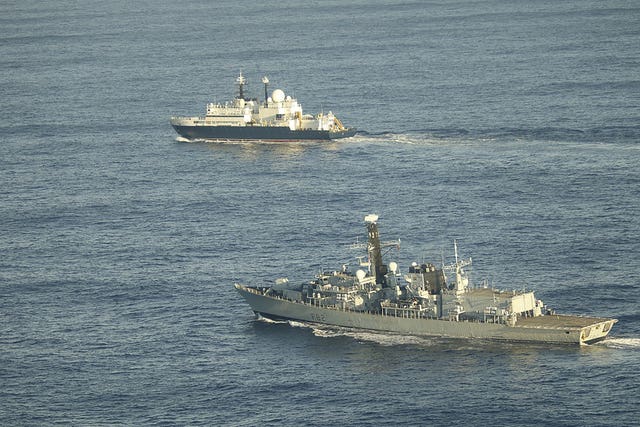Around 570 cables carry up to 99% of the world’s intercontinental telecommunications data.
MPs and peers have warned they are “not confident” the UK could protect its undersea cables from attacks that could cause “catastrophic disruption” to the financial and communications systems Britons rely on.
UK offshore cables are “sufficiently vulnerable to make them a target” for Vladimir Putin if he ramps up his tests of Nato’s resilience, the National Security Strategy Committee said.
Concerns have been growing about the threat from foreign adversaries to subsea infrastructure critical to internet connectivity.
There is evidence Moscow is preparing for sabotage, with the Russian spy vessel Yantar caught loitering over UK offshore cables in January.
The Government is “too timid” in defending its roughly 50 active undersea cables, on which the UK is almost entirely reliant for data transmission to the rest of the world, according to the committee, which criticised the “inadequacy” of security preparations.
The parliamentarians stressed there is “no imminent threat” to the UK’s national connectivity and that processes to fix routine damage to these power lines — often caused by fishing vessels dragging anchors — are robust.
But they said “focusing on fishing accidents and low-level sabotage is no longer good enough” amid rising geopolitical tensions.
And they warned that in a conflict, co-ordinated attacks could cause internet blackouts, cripple payment systems and supply chains, and overstretch emergency services.
Military communications and financial services could be hit, threatening billions of dollars worth of cross-border trading carried through subsea cables every day.
The committee wrote in its report: “Given the deteriorating security environment and the UK’s growing military role in Europe, we can no longer rule out the possibility of UK infrastructure being targeted in a crisis.
“We are also not confident that the UK could prevent such attacks or recover within an acceptable time period.”

The MPs and peers called for “more muscular deterrence”, including major fines and criminal liability for malicious cable damage and increased “direct physical interdiction and prosecution” of suspicious vessels and crew.
The Government should support the industry in rolling out new monitoring and alert systems to improve early warning and vessel interception, they added.
They also recommended that ministers acquire a cable repair ship by 2030, as the UK currently has no vessel of its own and relies on international consortiums, where repairs can be slow and potentially unreliable in a crisis.
Committee chairman Matt Western said: “Undersea cables are the invisible backbone of the internet. Everything from everyday WhatsApp messages to financial transactions worth billions of dollars are carried through this network. The scale of the UK’s strategic reliance needs to be taken more seriously.
“While our national connectivity does not face immediate danger, we must prepare for the possibility that our cables can be threatened in the event of a security crisis. Putin has shown every sign of wanting to test the soft underbelly of the Nato alliance. Our cables are sufficiently vulnerable to make them a target.
“Competent and farsighted preparation is essential. The past 25 years show that unlikely events can happen with surprising speed and frequency. Unintended escalation is a particular concern given events in Ukraine.
“The Government must raise its gaze. Focusing on fishing accidents and low-level incidents is no longer good enough. We need stronger physical protections, better options to impose genuine costs for malicious activity, and more comprehensive recovery plans.
“It is conceivable that the UK’s national resilience will be tested in the coming years. We need to be ready.”
The Government has been contacted for comment.

